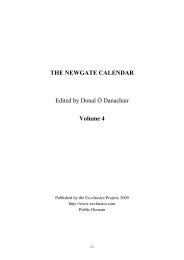PDF format (1.55 Mb) - The Ex-Classics Web Site
PDF format (1.55 Mb) - The Ex-Classics Web Site
PDF format (1.55 Mb) - The Ex-Classics Web Site
You also want an ePaper? Increase the reach of your titles
YUMPU automatically turns print PDFs into web optimized ePapers that Google loves.
THE ANATOMY OF MELANCHOLY<br />
new, as it shall seem to them best. To proceed, if the earth be 21,500 miles in compass, its<br />
diameter is 7,000 from us to our antipodes, and what shall be comprehended in all that space?<br />
What is the centre of the earth? is it pure element only, as Aristotle decrees, inhabited (as<br />
Paracelsus thinks) with creatures, whose chaos is the earth: or with fairies, as the woods and<br />
waters (according to him) are with nymphs, or as the air with spirits? Dionisiodorus, a<br />
mathematician in Pliny, that sent a letter, ad superos after he was dead, from the centre of the<br />
earth, to signify what distance the same centre was from the superficies of the same, viz. 42,000<br />
stadiums, might have done well to have satisfied all these doubts. Or is it the place of hell, as<br />
Virgil in his Aenides, Plato, Lucian, Dante, and others poetically describe it, and as many of our<br />
divines think? In good earnest, Anthony Rusca, one of the society of that Ambrosian College, in<br />
Milan, in his great volume de Inferno, lib. 1. cap. 47. is stiff in this tenet, 'tis a corporeal fire tow,<br />
cap. 5. I. 2. as he there disputes. "Whatsoever philosophers write" (saith Surius) "there be certain<br />
mouths of hell, and places appointed for the punishment of men's souls, as at Hecla in Iceland,<br />
where the ghosts of dead men are familiarly seen, and sometimes talk with the living: God would<br />
have such visible places, that mortal men might be certainly informed, that there be such<br />
punishments after death, and learn hence to fear God." Kranzius Dan. hist. lib. 2. cap. 24.<br />
subscribes to this opinion of Surius, so doth Colerus cap. 12. lib. de immortal animæ (out of the<br />
authority belike of St. Gregory, Durand, and the rest of the schoolmen, who derive as much from<br />
Aetna in Sicily, Lipari, Hiera, and those sulphureous vulcanian islands) making Terra del Fuego,<br />
and those frequent volcanoes in America, of which Acosta lib. 3. cap. 24. that fearful mount<br />
Hecklebirg in Norway, an especial argument to prove it, "where lamentable screeches and<br />
howlings are continually heard, which strike a terror to the auditors; fiery chariots are commonly<br />
seen to bring in the souls of men in the likeness of crows, and devils ordinarily go in and out."<br />
Such another proof is that place near the Pyramids in Egypt, by Cairo, as well to confirm this as<br />
the resurrection, mentioned by Kornmannus mirac. mort. lib. 1. cap. 30. Camerarius oper. suc.<br />
cap. 37. Bredenbachius pereg. ter. sanct. and some others, "where once a year dead bodies arise<br />
about March, and walk, after awhile hide themselves again: thousands of people come yearly to<br />
see them." But these and such like testimonies others reject, as fables, illusions of spirits, and<br />
they will have no such local known place, more than Styx or Phlegethon, Pluto's court, or that<br />
poetical Infernus, where Homer's soul was seen hanging on a tree, &c., to which they ferried<br />
over in Charon's boat, or went down at Hermione in Greece, compendiaria ad Infernos via,<br />
which is the shortest cut, quia nullum a mortuis naulum eo loci exposcunt, (saith Gerbelius) and<br />
besides there were no fees to be paid. Well then, is it hell, or purgatory, as Bellarmine: or Limbus<br />
patrum, as Gallucius will, and as Rusca will (for they have made maps of it) or Ignatius parler?<br />
Virgil, sometimes bishop of Saltburg (as Aventinus anno 745 relates) by Bonifacius bishop of<br />
Mentz was therefore called in question, because he held antipodes (which they made a doubt<br />
whether Christ died for) and so by that means took away the seat of hell, or so contracted it, that<br />
it could bear no proportion to heaven, and contradicted that opinion of Austin, Basil, Lactantius<br />
that held the earth round as a trencher (whom Acosta and common experience more largely<br />
confute) but not as a ball; and Jerusalem where Christ died the middle of it; or Delos, as the<br />
fabulous Greeks feigned: because when Jupiter let two eagles loose, to fly from the world's ends<br />
east and west, they met at Delos. But that scruple of Bonifacius is now quite taken away by our<br />
latter divines: Franciscus Ribera, in cap. 14. Apocalyps. will have hell a material and local fire in<br />
-42
















